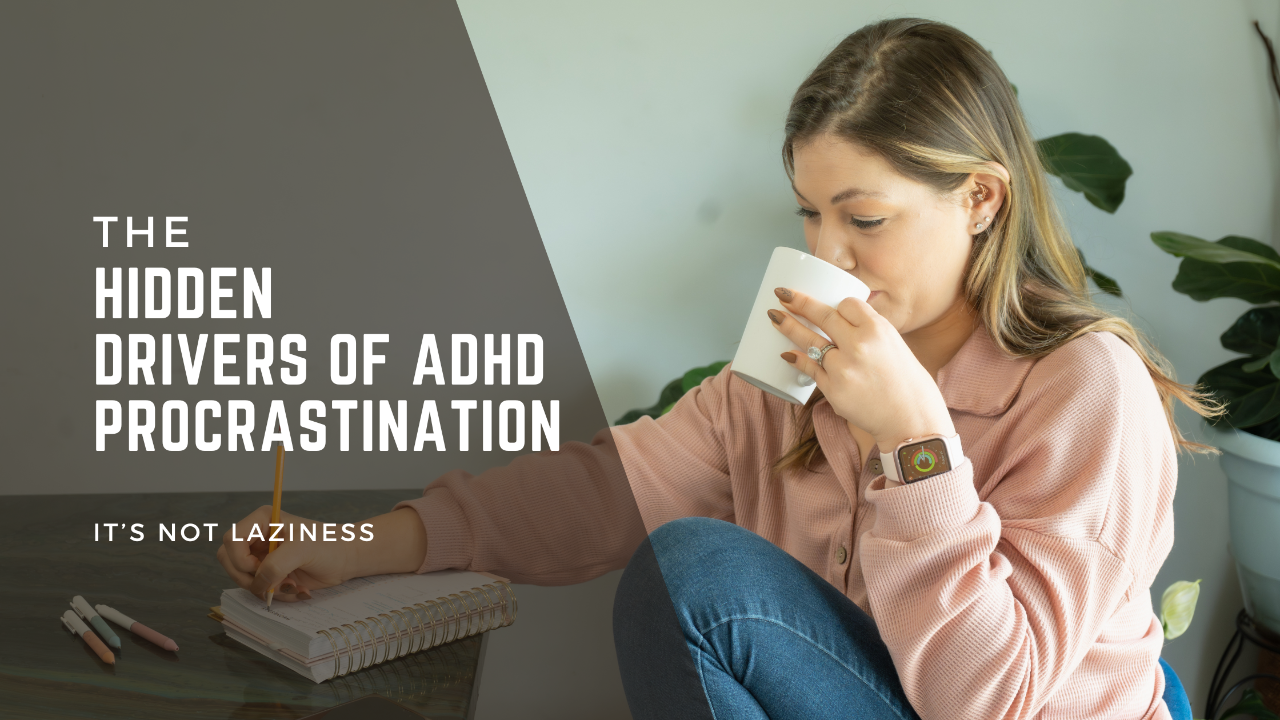
The Hidden Drivers of ADHD Procrastination: It’s Not Laziness
Oct 14, 2024Ever stare at a task, fully aware it needs to get done yet still can’t bring yourself to start? That’s not chaos. That’s your nervous system hitting pause.
Welcome to the quiet chaos of ADHD procrastination.
You know you’re capable. You’ve written the lists, set the deadlines, and promised yourself this time will be different.
And yet you still don’t start.
The guilt hits, the self-talk spirals:
“Why can’t I just do it? Am I lazy?”
You’re not lazy. You’re overwhelmed.
Why ADHD Procrastination Isn’t About Willpower
Procrastination isn’t a lack of discipline; it’s a nervous system response.
When your brain feels emotionally flooded, it shuts down to protect you. That’s not failure. That’s biology. Once you understand that, the story shifts from ‘I need more motivation’ to ‘I need more safety.’
Let’s look at what’s actually happening under the surface.
The Overwhelm Spiral: Why ADHD Brains Freeze
You’ve got a presentation coming up. You want to start, but the pressure builds before you even open your laptop.
Your brain says: Too much. Too big. Too fast.
So instead, you scroll, tidy your desk, or binge something “for a break.”
Not because you don’t care, but because the emotional weight of starting feels unbearable.
This isn’t avoidance for fun. It’s your brain trying to downshift the emotional noise so you can breathe again.
Perfectionism’s Sneaky Trap for ADHDers
You’re building something meaningful - a new offer, a launch, a project you actually care about.
Every time you sit down to make progress, the voice kicks in:
“It’s not ready yet.”
“Just one more tweak.”
Perfectionism feels like control, but it’s actually fear in disguise.
For ADHD brains, that pressure to “get it right” can be paralyzing. So you wait… hoping clarity will arrive later.
But later just becomes another cycle of “not yet.”
The Fear of Judgment and ADHD Rejection Sensitivity
You’ve got a half-finished proposal sitting in your drafts because… what if people don’t like it?
What if you’re misunderstood or worse, criticized?
Rejection sensitivity runs deep for ADHDers.
(If you want the science behind this, here’s a helpful overview https://www.agavehealth.com/post/layoff-anxiety-and-rejection-sensitive-dysphoria-rsd-what-adhd-brains-need-to-know
It’s easier to avoid finishing something than risk exposing it.
Your brain says: Better to stay invisible than be seen and rejected.
But invisibility doesn’t feel safe either; it just feels numb. The goal isn’t to silence the fear; it’s to help your body feel safe enough to move even with it.
Emotional Regulation: The Real Key to ADHD Procrastination
Procrastination isn’t about laziness; it’s about safety.
When your nervous system feels threatened (even by a to-do list), procrastination is how your brain hits “pause.”
It’s saying: This feels too big. Too risky. Too much.
The shift happens when you stop fighting that response and start working with it.
How to Break the Cycle (Gently)
Chunk it down.
Big tasks = big emotions.
Shrink the scope until it feels doable, not ideal, just doable.
When your brain says “it’s too much,” it usually means it can’t see the next clear step.
Start by breaking it into something visible:
Instead of “I’ll finish the whole project,” try “I’ll open the doc and jot down what I already know.”
And if that still feels hard, use a tool or a voice to help you break it apart.
Personally, I use ChatGPT for this all the time, I’ll literally talk it out:
“Here’s what I’m trying to do. Here’s where I’m stuck. Here’s how it feels.”
When I can name the emotion and the obstacle, it helps me see the next micro-step.
If you prefer something structured, try Goblin Tools; it’s great for chunking tasks when your brain freezes.
But if you’re like me and process better out loud, ChatGPT can mirror it back in real time.
The point isn’t to think your way through overwhelm.
It’s to offload it until what’s left feels small enough to start.
- Use small windows.
Set a timer for 5–10 minutes. Start there.
You don’t have to finish the task—you just have to begin. Momentum will often do the rest. - Challenge perfectionism.
Done teaches. Done builds trust.
Done creates safety.
Perfection never arrives, but progress does. - Reframe the fear.
Fear is sneaky. It rarely sounds like “I’m scared.”
It sounds like:
“I just need to organize first.”
“I’ll start when I have more energy.”
“It’s not ready yet.”
But underneath, it’s often fear of being seen or seen as not enough.
When you notice yourself hesitating, try reframing the question from “What if I fail?” to “What would support look like if this worked?”
That shift moves your brain out of self-protection and into self-leadership.
Because you’re not avoiding the task, you’re avoiding the potential pain.
And that’s something you can work with.
You don’t have to be fearless to start.
You just need to make the start feel safe.
You’re Not Lazy. You’re Wired Differently.
When you stop judging your procrastination and start understanding it, you create space for compassion and movement.
And compassion fuels consistency far better than shame ever could.
If you’re ready to dig deeper into how your nervous system and brain wiring shape your habits,
check out The Procrastination Rewire
It’s not about “fixing” you, it’s about helping your brain feel safe enough to do what it already knows how to do.
Suggested Image Alt Text (SEO-friendly, human-sounding)
- “ADHD procrastination feeling like overwhelm instead of laziness”
- “ADHD brain freeze during tasks due to emotional overload”
- “Perfectionism and fear of judgment in ADHD work habits”
“Chunking tasks into small steps for ADHD support”

